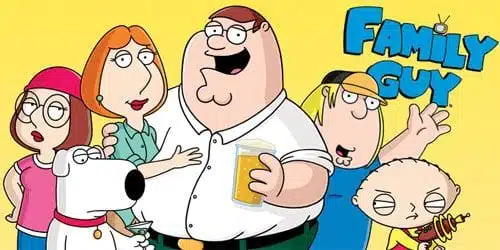
Family Guy has an enormous Simpsons problem. It’s the more popular show, but for anyone over 20, it’s perceived as inferior. It’s been trying to move out from behind the long shadow of The Simpsons since its premiere in 1999, and has succeeded/failed to varying degrees. But where it counts the most (the quality of the show), Family Guy is more like The Simpsons than anyone would like to admit—after a few seasons of solid, under the radar comedy, it’s gone populist, and taken to recycling plots and relying on cheap pop culture references for jokes.
Family Guy owes obvious debts to The Simpsons, but that doesn’t necessarily make The Simpsons the superior program—there hasn’t been a truly great Simpsons episode in roughly 10 years, leaving it as the Brett Favre to Family Guy’s Aaron Rodgers. The old form is favored by the old timers (you should have seen it back in 1996!), and the new form is favored by the youngsters (those old shows are dried up and lame!), with both sides being entirely wrong.
The Simpsons was always about pop culture references, but they made sure not to harm the flow of the episode’s pacing to make jokes about The Crying Game. Family Guy’s jokes are more tasteless, and mostly stupid, but they’ve been more inspired over the show’s run against similar episodes of The Simpsons.
The DVD set (“Volume 6”) of the sixth season of Family Guy contains a smattering of cut scenes (all of which could have been cut and pasted at will into any episode), and a bunch of commentaries from cast and production staff. Also curiously included are the original TV-aired episodes, and the one that appears on the DVD (as if anyone watching wants to watch episodes with the swear words beeped out).
Plot has never really been an important device in cartoons (unless it’s the superior to all of Fox’s Sunday cartoons, King of the Hill), but Family Guy takes that to an incredibly bare degree—there’s nothing to demarcate what begins any given season or ends it. The Griffin family (the Homer Simpson-esque Peter Griffin, his wife Lois, kids Chris, Meg, and Stewie, and their talking dog Brian) never changes (except in superficial ways like Peter’s job) and never learns anything. Nothing is important to individual episode but the random references that keep them together.
But Family Guy disrupts any semblance of plot to make said pop culture references. And in season seven, Family Guy hews pretty close to the charges levied at it from South Park: the references are chosen at random by manatees.
These pop culture in-jokes are okay to swallow (by now, Family Guy’s way of making a joke is pretty well established—“You think that’s bad, it’s like the time I ate dinner with Hamid Karzai”) but by this time in the show’s run, I think the writers are growing tired (this is perhaps most evident in the show’s current season, where they’ve made two lengthy Back to the Future references in as many episodes).
Plus, the show’s references used to be outré and catered towards pop culture-philes (how else would you explain lengthy references to Minnie Driver’s huge head, Ben Affleck preparing for acting roles in three minutes on his couch, among thousands others), now they’re aimed at the wider audience the show has (like the previously mentioned Back to the Future references). Often, the references play like segments in The Epic Movie vein—winking references to pop culture items that every person watching Family Guy knows.
Family Guy’s sixth season does have two episodes with something resembling a plot — a two-episode arc that finds Stewie finally acting on the empty death threats he’s shouted at his mother since the get go. Stewie seizes his opportunity when Lois and Peter go on a vacation without him, and he kills Lois on a cruise ship. This leads to Peter being accused, and an epic court case that ends with Lois not being dead. Stewie flees after Lois tells everyone he’s the culprit, eventually taking over the world. Just when you think Stewie is vanquished for good (after a massive fight between Lois and Brian and Stewie), it turns out the whole two episodes were a simulation that Stewie is running to see what would happen if he killed Lois.
The show gets meta in the conclusion — Brian says, “So if someone watched the simulation, it would be a total waste of their time?” Stewie responds, “Well, hopefully they would enjoy the ride.” That sentiment proves to be rather fitting, the two episodes were the season’s strongest, as the plot took center stage in order for it to be advanced as far as it needed to go. The references that were tossed in were mostly funny (Lois is saved by a Merman whose top half is a fish head), and served the plot. Unfortunately the momentum established by the two episodes doesn’t carry over to the rest of the season.
When Family Guy was revived by FOX aftet big DVD sales and success in syndication, it was all but pre-ordained that the show would get more extreme in its jokes and go full throttle towards complete irreverence. FOX had already canceled the show twice, and made a big deal about re-launching it, so another cancellation seems impossible. But given the show’s current trajectory and the quality of its recent episodes, you have to wonder how long they can keep it up before a shake-up is necessary. It’ll probably take a new animated show to call Family Guy out for its indiscretions, kind of like how Family Guy did the same for The Simpsons.
